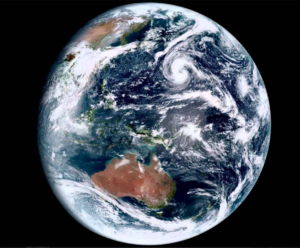By Charles Bensinger
 What’s a living planet to do when she feels mortally threatened? Mobilize her immune system.
What’s a living planet to do when she feels mortally threatened? Mobilize her immune system.
Let’s examine the symptoms of a sick planet.
- Shortness of breath: Planetary oxygen is decreasing due to loss of phytoplankton in the oceans. These tiny microbes, called the “lung of our planet” perform the vital job of converting carbon dioxide to oxygen. Supplying 50 to 80% of the world’s oxygen, really every other breath we take, phytoplankton levels are down a staggering 40% since 1950 due to the rapid heating of the seas, loss of vital nutrients and widespread plastic pollution. Massive forest fires, widespread deforestation and soil degradation further compromise the planet’s ability to perform photosynthesis, which converts carbon dioxide into life-giving oxygen. Check
- Dry Cough: Well, Gaia is not so vocal, but she is certainly choked up by the high levels of toxic chemicals and greenhouse gases emitted from industrial operations and transportation. These noxious materials cast dark palls above cities and valleys, clogging the atmosphere’s ability to remain healthy. Call it a silent cough. Check
- Fever: Global temperature has increased by 0.95 degrees C/1.7 degrees F since the pre-industrial era (1880-1900), but climate scientists say it will rise a scary 4 to 5 degrees C by 2100. Welcome to Hothouse Earth, commonly referred to as global warming. Check
- Tiredness: Massive species extinction radically diminishes the ability of the natural environment to support the myriad of life forms which require clean air and water, food and space in which to live. As Critical life-support systems collapse or are destroyed, the wheelwork of nature slows. Check
Clearly, Gaia’s got the virus; call it Homo sapiens-2020. We’ve met the virus and it’s us.
Let’s take a closer look at how the clever invader does its damage. It first invades the natural environment and plunders its resources of water, timber, animals, fish, plants and minerals to make more copies of itself. It then infects Gaia’s life-support system, compromising the clean air, water, and soil quality upon which the ancient web of life depends. It does this so rapidly that the natural environment is unable to cope, adjust or compensate in a timely manner.
As Gaia scrambles to respond to the rapidly deteriorating physical situation, she calls up her big guns — drought, plague, fire, floods, hurricanes and cyclones in an effort to stave off planetary pneumonia. Planetary pneumonia happens when the planet’s biospheric system becomes clogged with noxious materials and is no longer able to function properly. The critical balance of carbon dioxide and oxygen conversion, managed by photosynthesis and atmospheric cleansing mechanisms, is now dangerously, perhaps fatally, impaired.